4-Peat!
UH Entrepreneurship Program Ranks No. 1 in Nation for Fourth Consecutive Year

The Cyvia and Melvyn Wolff Center for Entrepreneurship in the C. T. Bauer College of Business at the University of Houston has been named the No. 1 undergraduate entrepreneurship program in the United States for the fourth consecutive year – the longest streak in the program’s history.
The Wolff Center has ranked No. 1 in the annual list compiled by The Princeton Review and published in Entrepreneur magazine a total of seven times. It has ranked in the Top 10 each year since 2007.
“Another No. 1 ranking proves that there is no slowing down UH’s Wolff Center. It takes hard work, commitment and innovation to achieve a No. 1 ranking, and this center clearly demonstrates all of these traits … and many more,” said Robert McPherson, interim senior vice president for academic affairs and provost. “I’d like to commend our faculty and students for, once again, taking the Wolff Center to the top of The Princeton Review’s list of top schools for entrepreneurship studies.”
“Our entrepreneurship program is the crown jewel of the Bauer College. But it is also a testament to the support we have received from the community," said Dean and Cullen Distinguished Chair Professor Paul A. Pavlou. "In the last several years, we have been fortunate to receive numerous generous donations that are funding life-changing scholarships for our students, enabling us to recruit and train the next generation of successful entrepreneurs."

Wolff Center graduates have created 1,640 businesses over the past decade.
Wolff Center graduates have created 1,640 businesses over the past decade.

The Princeton Review annually ranks nearly 300 U.S. business schools with entrepreneurship programs.
The Princeton Review annually ranks nearly 300 U.S. business schools with entrepreneurship programs.
The Cyvia and Melvyn Wolff Center for Entrepreneurship in the C. T. Bauer College of Business at the University of Houston has been named the No. 1 undergraduate entrepreneurship program in the United States for the fourth consecutive year – the longest streak in the program’s history.
The Wolff Center has ranked No. 1 in the annual list compiled by The Princeton Review and published in Entrepreneur magazine a total of seven times. It has ranked in the Top 10 each year since 2007.
“Another No. 1 ranking proves that there is no slowing down UH’s Wolff Center. It takes hard work, commitment and innovation to achieve a No. 1 ranking, and this center clearly demonstrates all of these traits … and many more,” said Robert McPherson, interim senior vice president for academic affairs and provost. “I’d like to commend our faculty and students for once again taking the Wolff Center to the top of The Princeton Review’s list of top schools for entrepreneurship studies.”
“Our entrepreneurship program is the crown jewel of the Bauer College. But it is also a testament to the support we have received from the community," said Dean and Cullen Distinguished Chair Professor Paul A. Pavlou. "In the last several years, we have been fortunate to receive numerous generous donations that are funding life-changing scholarships for our students, enabling us to recruit and train the next generation of successful entrepreneurs."

Wolff Center graduates have created 1,640 businesses over the past decade.
Wolff Center graduates have created 1,640 businesses over the past decade.
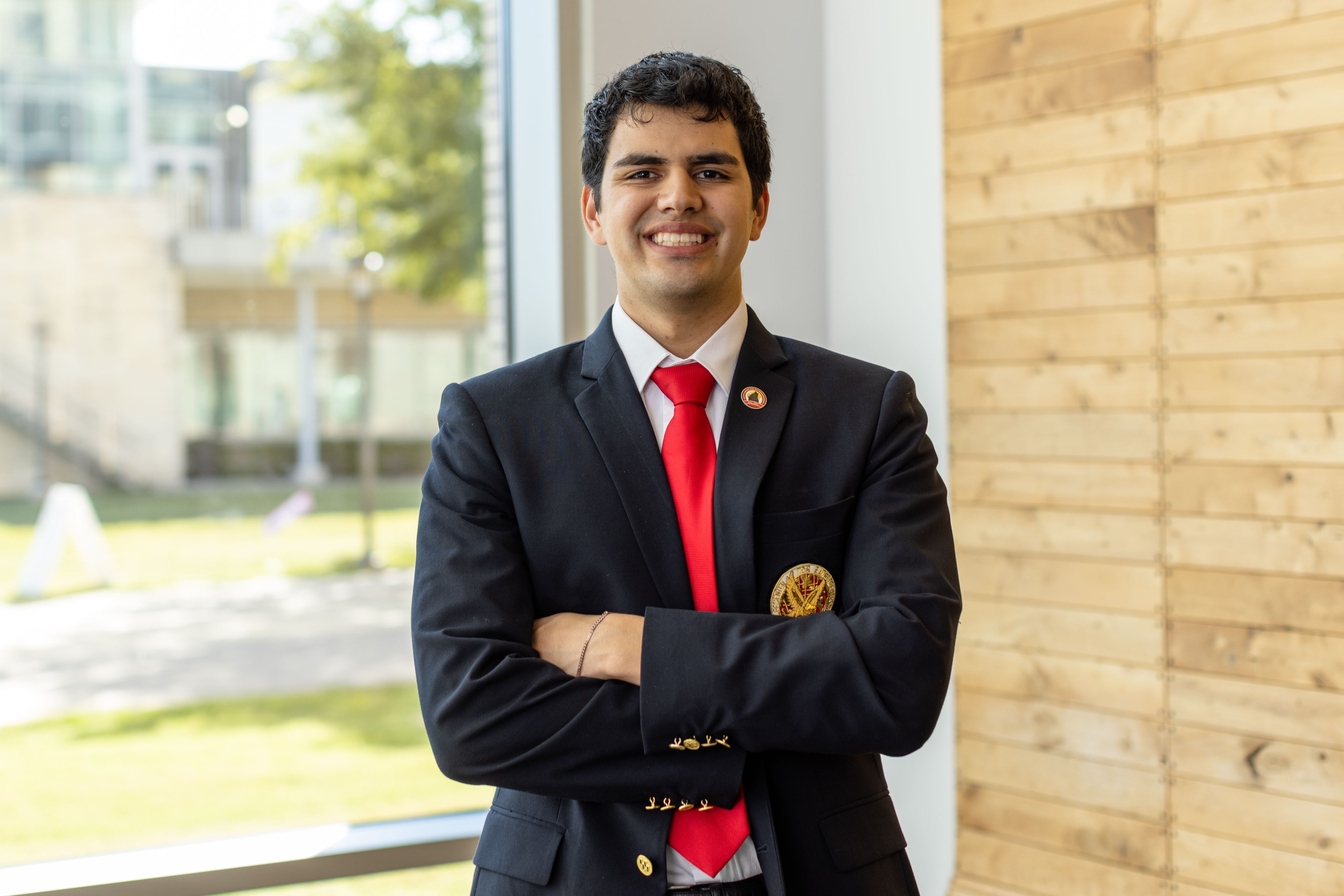
The Princeton Review annually ranks nearly 300 U.S. business schools with entrepreneurship programs.
The Princeton Review annually ranks nearly 300 U.S. business schools with entrepreneurship programs.
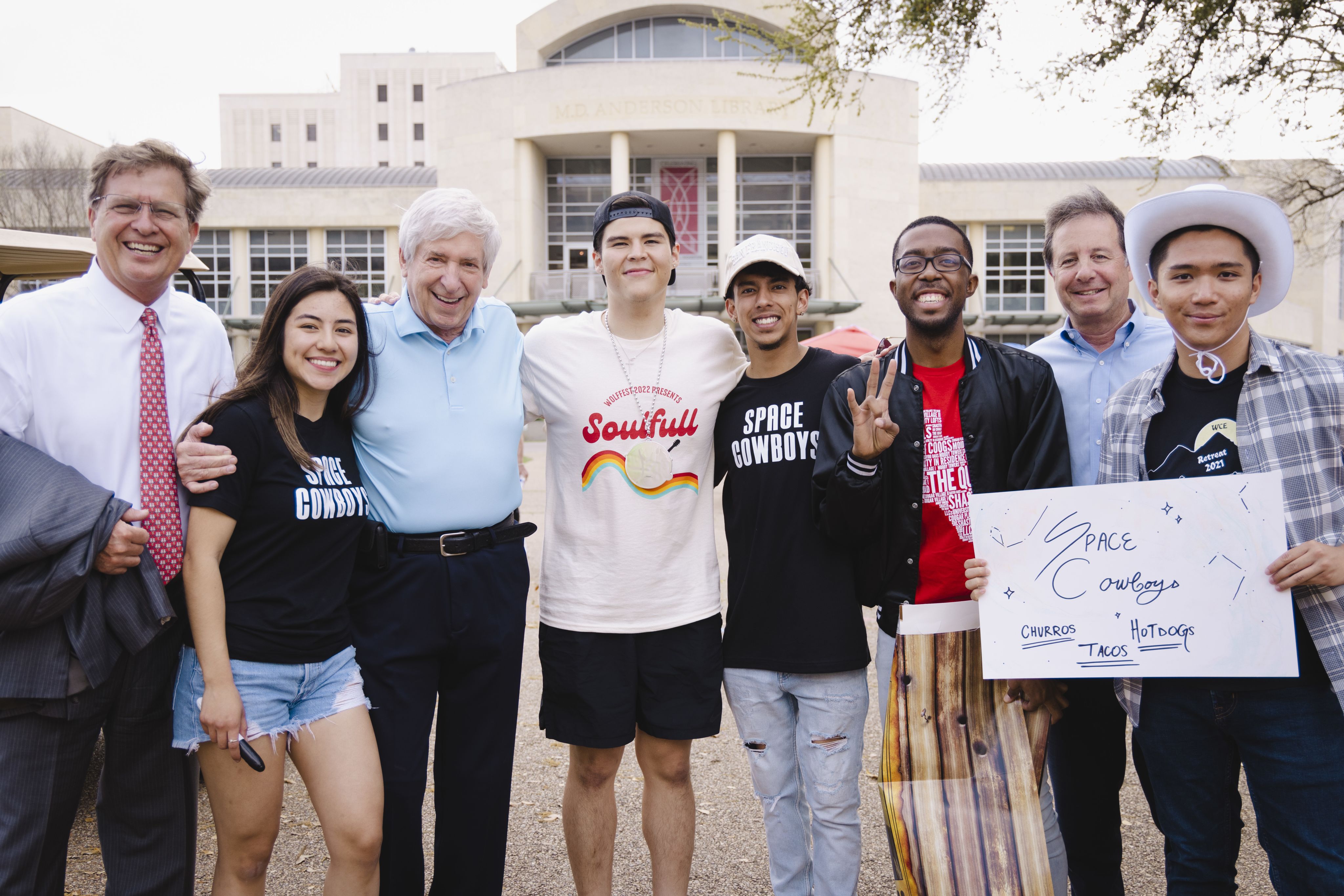
The competitive cohort program consists of 25 to 40 students each year.
The competitive cohort program consists of 25 to 40 students each year.
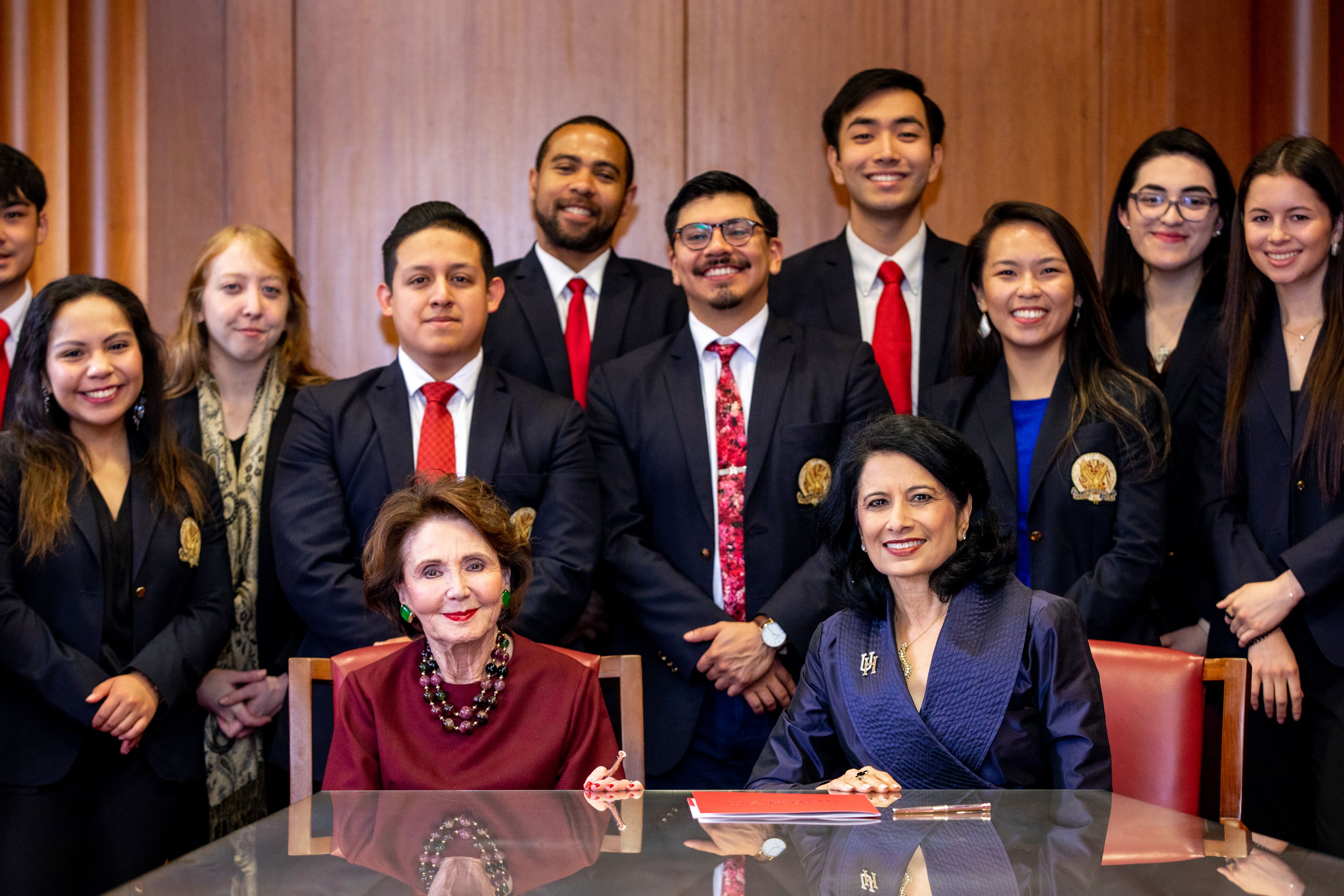
Cyvia Wolff with UH President Renu Khator and students.
Cyvia Wolff with UH President Renu Khator and students.
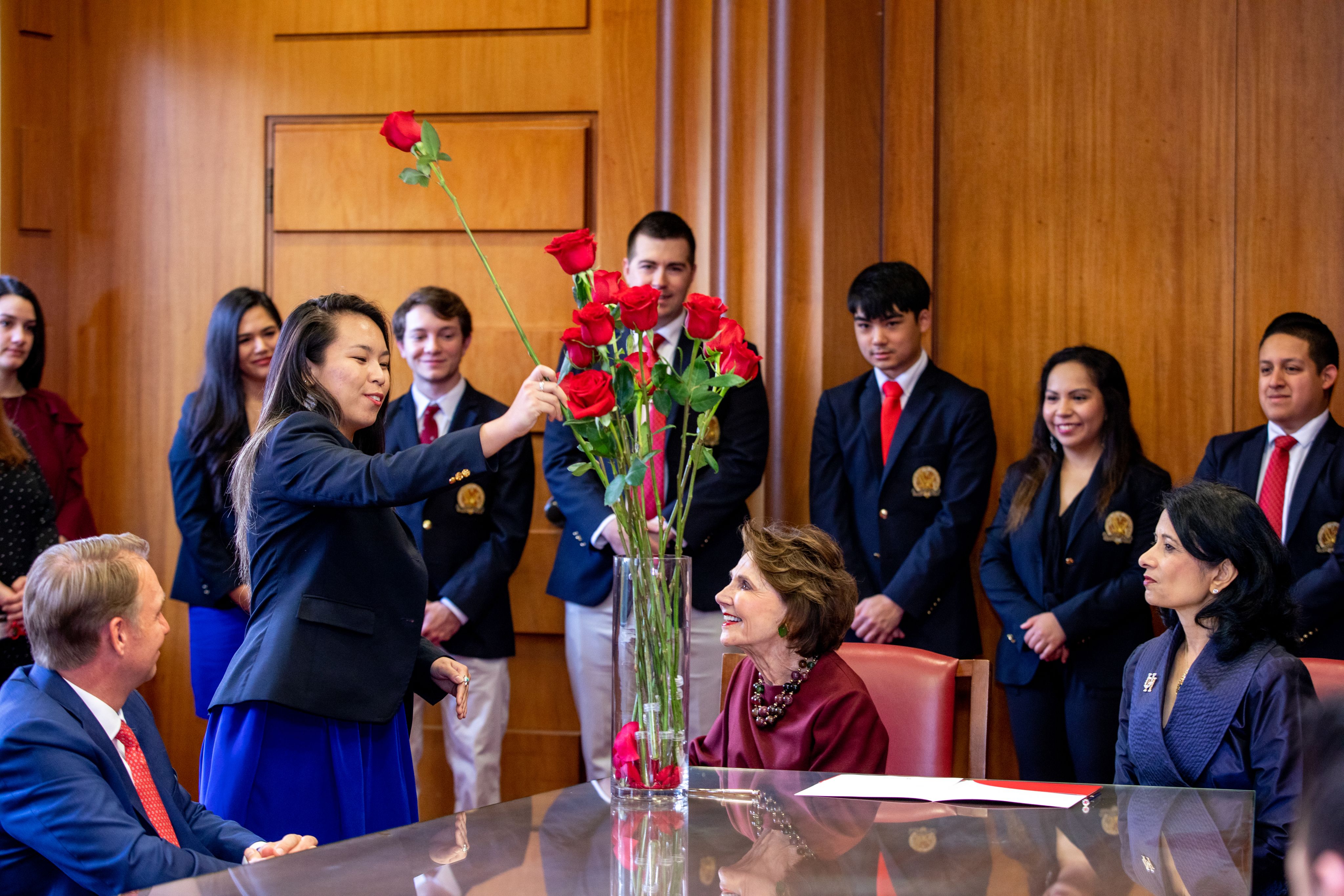
Most students in the program are the first generation in their family to attend college.
Most students in the program are the first generation in their family to attend college.
Donors, professional partners and business mentors are fundamental to the continued excellence of the competitive cohort program, which consists of 25 to 40 students, said Wolff Center Executive Director Dave Cook.
“We are delighted with the ranking,” Cook said. “Moreover, every year we are reaching more students, transforming more lives and adding more mentors from the business community. The focus at the Wolff Center is really about creating leaders and entrepreneurs with the highest integrity, which elevates everyone toward excellence. The focus now becomes, how do we replicate this even further in the community?”
The Center was named for Houston philanthropists Cyvia and Melvyn Wolff in 2007, and received a historic $13 million gift from the Cyvia and Melvyn Wolff Family Foundation in 2019, supplemented by a $2 million matching grant from the state of Texas. Additionally, the Wayne Duddlesten Foundation created endowed scholarships for Wolff Center students in 2021 with a $4 million gift.
These gifts help ensure continued success for a model program that has mastered the art of cultivating the next generation of business creators and innovators.
“The beauty of the Wolff Center is that we’re in Houston, a city so perfect for entrepreneurship.”
The Princeton Review annually ranks nearly 300 U.S. business schools with entrepreneurship programs, evaluating approximately 40 data points, such as experiential learning opportunities, career outcomes, business success and more. Graduates of the Wolff Center cohort program have created 1,640 businesses in the past 10 years and raised more than $400 million. Most students in the program are the first generation in their family to attend college, and more than half are paying their way through school.
The Wolff Center, however, draws many more innovators from across the UH campus with its programs, including 3,841 students from 92 different majors who took at least one entrepreneurship course last year.
Donors, professional partners and business mentors are fundamental to the continued excellence of the competitive cohort program, which consists of 25 to 40 students, said Wolff Center Executive Director Dave Cook.
“We are delighted with the ranking,” Cook said. “Moreover, every year we are reaching more students, transforming more lives, and adding more mentors from the business community. The focus at the Wolff Center is really about creating leaders and entrepreneurs with the highest integrity, which elevates everyone toward excellence. The focus now becomes, how do we replicate this even further in the community?”
The Center was named for Houston philanthropists Cyvia and Melvyn Wolff in 2007, and received a historic $13 million gift from the Cyvia and Melvyn Wolff Family Foundation in 2019, supplemented by a $2 million matching grant from the state of Texas. Additionally, the Wayne Duddlesten Foundation created endowed scholarships for Wolff Center students in 2021 with a $4 million gift.
These gifts help ensure continued success for a model program that has mastered the art of cultivating the next generation of business creators and innovators.
The Princeton Review annually ranks nearly 300 U.S. business schools with entrepreneurship programs, evaluating approximately 40 data points, such as experiential learning opportunities, career outcomes, business success and more. Graduates of the Wolff Center cohort program have created 1,640 businesses in the past 10 years and raised more than $400 million. Most students in the program are the first generation in their family to attend college, and more than half are paying their way through school.
The Wolff Center, however, draws many more innovators from across the UH campus with its programs, including 3,841 students from 92 different majors who took at least one entrepreneurship course last year.

The competitive cohort program consists of 25 to 40 students each year.
The competitive cohort program consists of 25 to 40 students each year.

Cyvia Wolff with UH President Renu Khator and students.
Cyvia Wolff with UH President Renu Khator and students.
“We are passionate about entrepreneurship and how it can forever transform lives.”
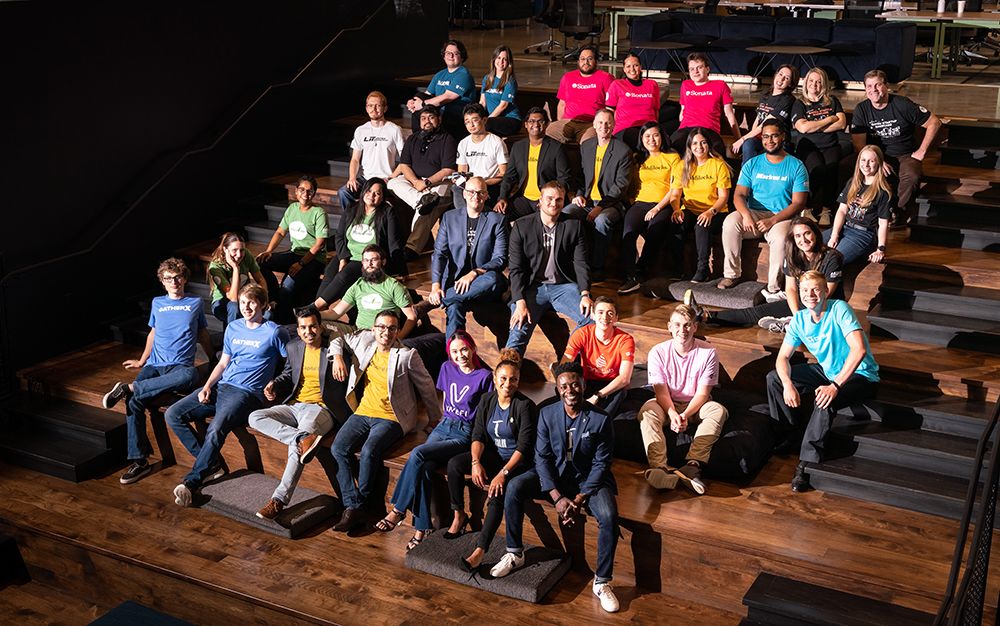
RED Labs Summer Accelerator Program is a 12-week program designed to help teams of UH students, faculty and recent alumni who have a startup idea.
RED Labs Summer Accelerator Program is a 12-week program designed to help teams of UH students, faculty and recent alumni who have a startup idea.
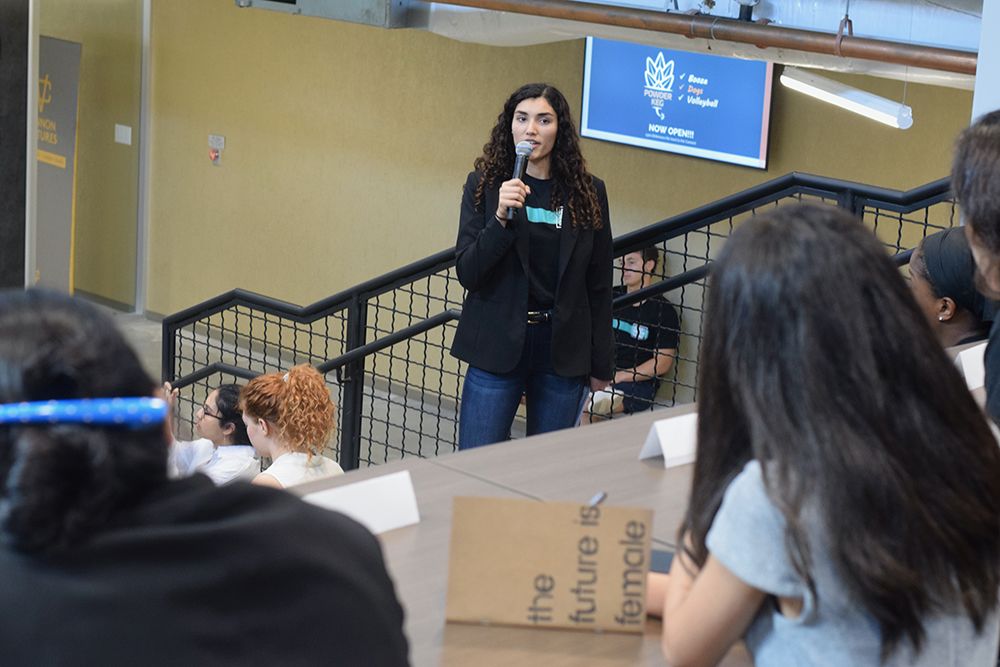
The Femtech(+) Innovation Challenge is a hack-a-thon style weekend where teams of UH students are asked to brainstorm business solutions to problems predominantly faced by women.
The Femtech(+) Innovation Challenge is a hack-a-thon style weekend where teams of UH students are asked to brainstorm business solutions to problems predominantly faced by women.
The Bauer College expanded the undergraduate major in entrepreneurship beyond the cohort program this fall and is also offering a master’s degree in entrepreneurship. RED Labs Summer Accelerator Program and RED Launch nurture fledgling technology business startups. UH Honors students can now supplement their degree plan by earning a Certificate of Entrepreneurship.
But in the spirit of being the No. 1 ranked entrepreneurship program in the nation, the Wolff Center is poised to become even more influential and accessible than ever, Cook said.
- Wolff Center students will soon lead roundtable discussions on entrepreneurship in specialized areas such as real estate, nonprofit organizations and technology – open to anyone on campus.
- Founder’s Club, a bi-monthly meeting of business owners at UH, will expand to include community business owners as well.
- Recorded lectures and other resources from the cohort program will become more widely available. The Center’s ability to share business creation support with specialized groups such as Femtech, an offshoot of RED Labs aimed at women will grow when it gains a new physical space. Its outreach to off-campus groups that have an interest in starting businesses is also growing, with Wolff Center alumni working with high school students and current students now working with female prison inmates through the group Empowering Women Inmates out of Prison (EWOP).
“We are passionate about entrepreneurship and how it can forever transform lives,” Pavlou concluded. “We seek to further promote entrepreneurship as a university-wide, even regional and national effort. We really believe in the power of collaboration, coming together and embracing everyone around us to create a strong ecosystem of innovation in Houston, Texas, and across the United States.”
- By Julie Bonnin
The Bauer College expanded the undergraduate major in entrepreneurship beyond the cohort program this fall and is also offering a master’s degree in entrepreneurship. RED Labs Summer Accelerator Program and RED Launch nurture fledgling technology business startups. UH Honors students can now supplement their degree plan by earning a Certificate of Entrepreneurship.
But in the spirit of being the No. 1 ranked entrepreneurship program in the nation, the Wolff Center is poised to become even more influential and accessible than ever, Cook said.
- Wolff Center students will soon lead roundtable discussions on entrepreneurship in specialized areas such as real estate, non-profit organizations, and technology – open to anyone on campus.
- Founder’s Club, a bi-monthly meeting of business owners at UH, will expand to include community business owners as well.
- Recorded lectures and other resources from the cohort program will become more widely available. The Center’s ability to share business creation support with specialized groups such as Femtech, an offshoot of RED Labs aimed at women will grow when it gains a new physical space. Its outreach to off-campus groups that have an interest in starting businesses is also growing, with Wolff Center alumni working with high school students and current students now working with female prison inmates through the group Empowering Women Inmates out of Prison (EWOP).
“We are passionate about entrepreneurship and how it can forever transform lives,” Pavlou concluded. “We seek to further promote entrepreneurship as a university-wide, even regional and national effort. We really believe in the power of collaboration, coming together and embracing everyone around us to create a strong ecosystem of innovation in Houston, Texas, and across the United States.”
- By Julie Bonnin

RED Labs Summer Accelerator Program is a 12-week program designed to help teams of UH students, faculty and recent alumni who have a startup idea.
RED Labs Summer Accelerator Program is a 12-week program designed to help teams of UH students, faculty and recent alumni who have a startup idea.

The Femtech(+) Innovation Challenge is a hack-a-thon style weekend where teams of UH students are asked to brainstorm business solutions to problems predominantly faced by women.
The Femtech(+) Innovation Challenge is a hack-a-thon style weekend where teams of UH students are asked to brainstorm business solutions to problems predominantly faced by women.
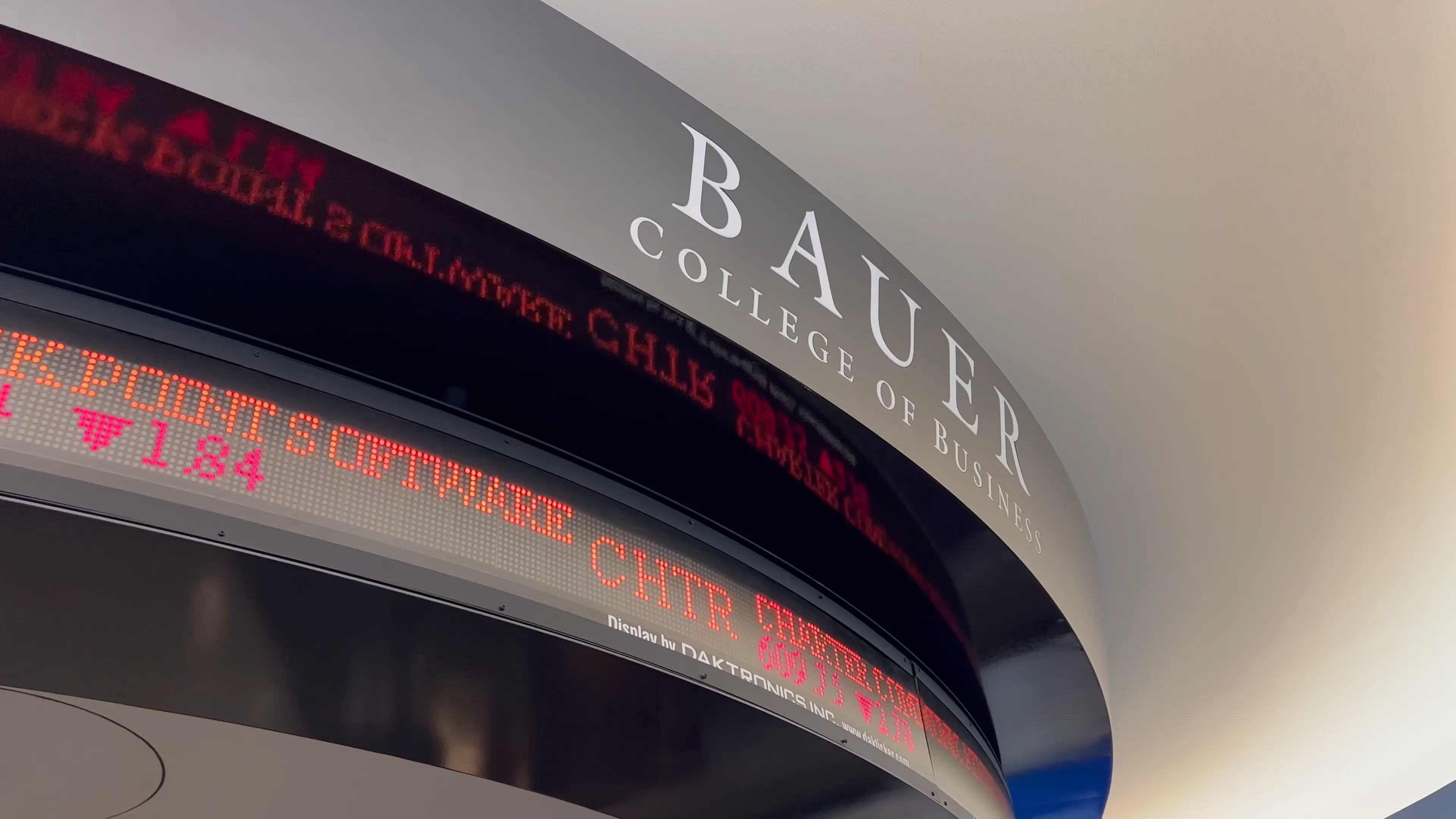
Chief Visionary
These days … once again … you will have to excuse Dave Cook’s extra wide smile. For seven years out of the past 10, Cook’s pride and joy, the Cyvia and Melvyn Wolff Center for Entrepreneurship, has been named the country’s top undergraduate entrepreneur program. This year’s No. 1 ranking is the fourth year in a row in the top spot.
But exactly what inspires this solid string of wins?
Cook, the Wolff Center’s director and many say its chief visionary, traces the quest for excellence back to the very beginning.
“Houston businessman Bill Sherrill, founder of the Wolff Center, was a believer that leadership can be taught. That fundamental truth has remained at the core since 1991. Around that inspiration, we have recruited resources and built curricula that nurture visions specific to the entrepreneurial spirit,” he explained.
The calling expanded in depth and breadth to comprise three missions.
First is the Wolff Center for Entrepreneurship core program. “We are constantly looking at ways to make the cohort program better, and we will continue,” Cook said.
Second is its business accelerator program, which is open to all business visionaries at UH. Finally, is its community outreach. New projects target many groups, from inspiring local middle school students to mentoring incarcerated women who hope for a better life.
Cook also points to another factor with pride – the Wolff Center students, themselves.
“We want our program to look like the city of Houston. That rich diversity creates a cauldron of learning and tolerance students can thrive in. So when they leave here, they are ready to go anywhere and make a difference,” Cook said.
And there is a matter of heart, he added. “A Wolff Center student has an immigrant’s spirit, embarking on a journey to change everything. They offer grit, courage, stamina, then we add extraordinary training. Without exception, the Wolff Center experience elevates and improves lives and changes families for generations on.”
So, what will the newest Wolff Center students, the class of 2023 do? Just stand back and watch them follow familiar footsteps – and soar.
- Sara Strong

Dave Cook, executive director of the Wolff Center
Dave Cook, executive director of the Wolff Center


Danna Ceron, program manager
Danna Ceron, program manager
Voice of Experience
Should University of Houston entrepreneurship students ever need guidance, Danna Ceron offers the voice of experience. As a Wolff Center grad, herself, and a business owner, she traveled through happy successes and occasional self-doubts in the journey.
“I appreciate being surrounded by these crazy, amazing, inspiring entrepreneurs. This environment is where I thrive,” Ceron said. “I'm here to guide students. I can mentor, but I won’t babysit.”
She balances her position as program manager at the Cyvia and Melvyn Wolff Center for Entrepreneurship with the demands of CaliDanna, the ecommerce fashion line she started as a second semester Wolff student.
Her business name reflects her origins: “For me, it was important to honor where I came from – Cali, my hometown in Colombia. And Danna is my name. Put together, CaliDanna represents ‘calidad’ – the Spanish word for quality.”
“In the Wolff Center, I learned so much. For example, I developed a deeper understanding of myself and what I really want in life. I identified values that are important to me and my best path after graduation,” Ceron said.
Parts of that learning curve were bumpy. “The most daunting lesson I learned as a Wolff student was that failure is OK. My early stumbles taught me lessons and helped me grow. Without them, I wouldn’t be the person I am today,” she added.
That self-examination led her to realize a desire to help the economy of her original homeland, which is why her fashions are created in Colombia. Many are made in a program for women who are head of their households.
Once you find your values, Ceron explained, an important step to success is to align with business associates who honor the same priorities, making it easier to travel the road to success with the potential to change your life and those around you.
“Many students are first in their families to attend college. Some arrived as immigrants. When I see parents watch sons and daughters at Wolff Center’s graduation, realizing they succeeded at this country’s No. 1 undergraduate program in entrepreneurship – that has to be worth every sacrifice those parents made. It has to mean a lot.”
- Sara Strong
“In the Wolff Center, I learned so much. For example, I developed a deeper understanding of myself and what I really want in life. I identified values that are important to me and my best path after graduation.”
- Danna Ceron
Thriving Amid Disruption
Some of the world’s most well-known brands were born from disruption. Uber, Google, Tesla – each sparked success by leveraging opportunity that industry giants passed by.
In her early years, Keely McEnery became an expert in disruption, too. She experienced her parents’ divorce and remarriages, adjusted to living in two families, then endured the pain of profound sadness: first her mother’s cancer diagnosis, nine months later her stepfather’s unexpected death, and her mother’s passing just a few weeks after.
Over and over, her own future had to be re-envisioned.
“I find that the best opportunities for growth come from chaos,” she said. “At the center of everything, though, you have the power and freedom to choose whatever path you want in life.”
At home in Chicago, McEnery was looking for an undergraduate entrepreneurship program to finish her business degree. Her search landed on the C. T. Bauer College of Business Wolff Center for Entrepreneurship at the University of Houston.
“When I got in, I cried so much,” said McEnery, one of the 30-member Wolff Center class of 2023. “They really focus on building culture and the importance of community, helping each other out and giving back.”
Competing during her first semester on a student team, she was charged with finding a restaurant industry “pain point” then developing a way to fix it. McEnery and two colleagues came up with a new kind of shoe with a nonslip sole that replicates microscopic hairs on lizards’ feet. The team took first place.
“The beauty of the Wolff Center is that we’re in Houston, a city so perfect for entrepreneurship,” McEnery said. “I fell in love with Houston. It was a welcome culture shock of diversity and support. I plan on sticking around Houston for quite some time.”
Considering McEnery’s history of thriving amid disruption, no one at the Wolff Center doubted her adaptability or her no-matter-what drive to succeed. But old friends sometimes are surprised.
“A lot of people didn’t think I could get this far and are shocked I’ve made it with everything that’s happened in my life,” she said. “I want to keep pushing the boundaries, keep people thinking ‘What can Keely do next?’”
- Jessica Navarro
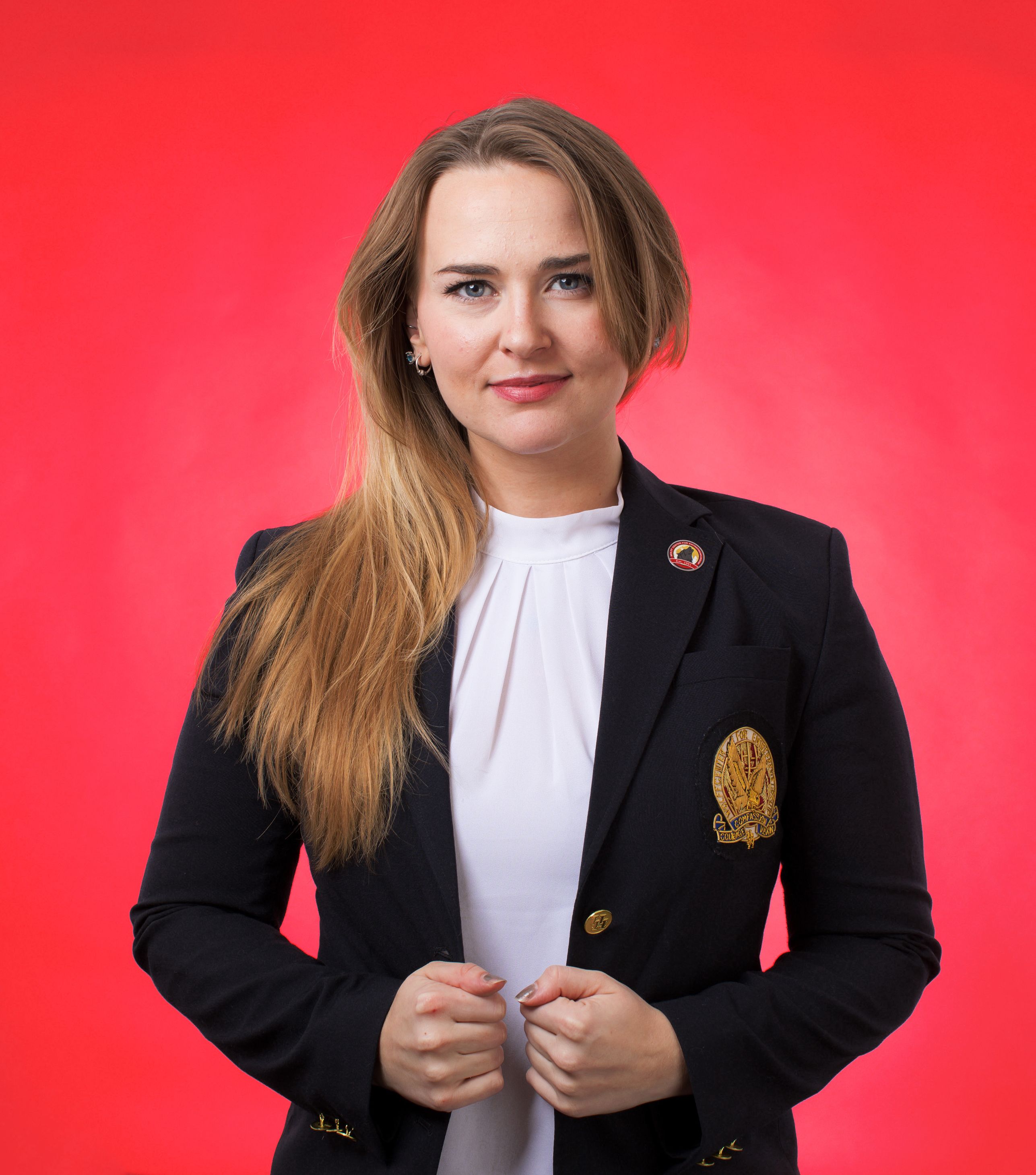
Keely McEnery, Wolff Center student
Keely McEnery, Wolff Center student


Wisam Nahhas and Nour Baki, Wolff Center graduates
Wisam Nahhas and Nour Baki, Wolff Center graduates
When Opportunity Meets Preparation
If you never filled up your gas-powered vehicle’s tank again, would you miss the gas pumps?
So certain of your answer were Wolff Center for Entrepreneurship graduates Nour Baki (’13) and Wisam Nahhas (’11) that they spotted a clear business opportunity and created a company they first called FuelMe.
Spoiler alert: The vision of these two University of Houston entrepreneurs was confirmed last April when Shell acquired their company. By then, the two business partners had pivoted their business model and launched Instafuel, aimed at servicing commercial fleets.
“That acquisition obviously is a huge milestone. We’ve been entrepreneurs for 10 years straight. The deal culminated on our 10th business anniversary, in April 2022,” Nahhas said.
Instafuel’s story begins when inspiration struck the two Wolff graduates, who had been buddies in early childhood.
“We were talking about how we hate going to the gas station. It was about the time Uber was appearing, so we said: ‘Why not deliver gasoline?’,” Nahhas remembered. Baki added: “A light bulb popped in our heads. And that spark took us on this 10-year journey.”
Their first business incarnation, FuelMe, offered to gas up vehicles at UH for fellow students, teachers and staff, and soon customers beyond the University. It was a hit, as predicted by Dave Cook, director of the Wolff Center.
“I remember he looked outside his office window and saw a sea of parked vehicles and said: ‘You know what? This could work. There’s no reason why it couldn’t’,” Baki said.
Leveraging their FuelMe success, Baki and Nour re-envisioned on a grander scale and launched Instafuel in 2015 to focus on fulfilling large commercial fleet’s fueling needs.
The root of their success? The partners credit the Wolff Center, especially the program’s mentors and guest experts. “That experience alone added a tremendous amount of value,” said Baki, who gave a nod to his mentor from his student days at the Wolff Center, Dimitri Karastamatis. “When things were bad, I’d call him. When things were good, I’d call him. He’s been an emotional backbone.”
As for Instafuel, it thrives within Shell and is ready for its future role in providing power, perhaps from alternative energy sources, that will serve the world ahead.
- Sara Strong
